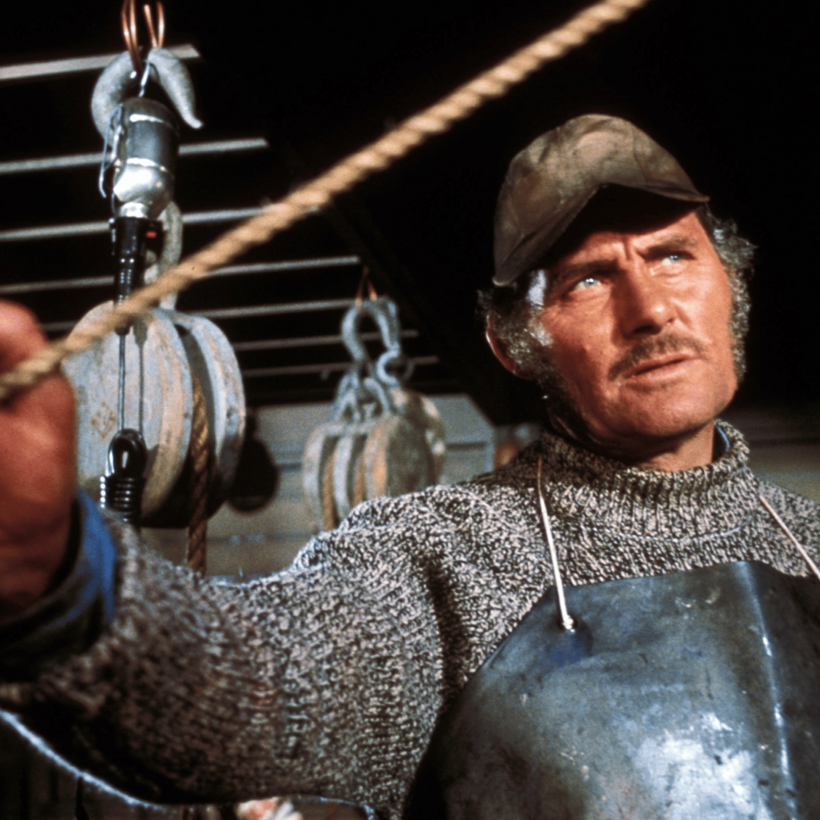Robert Shaw’s delivery of the U.S.S. Indianapolis speech in Steven Spielberg’s Jaws is one of the memorable moments in film history. It’s a throwback to the Shakespearean soliloquies performed in the 1940s, when actors such as Laurence Olivier and Alec Guinness would take the spotlight and unburden themselves to the audience, explaining an otherwise inexplicable character. “To be or not to be” revealed not only what Hamlet was thinking but the extent of his turmoil.
The U.S.S. Indianapolis speech serves to both explain Shaw’s character Quint’s obsession with sharks—he hates them because they killed so many of his fellow sailors after the torpedoing of his ship by Japanese forces during W.W. II—while also preparing the audience for the dramatic ending of the film.
How the speech came about is as extraordinary as the scene itself. It was not part of Peter Benchley’s original novel, nor in the original script. An unlikely series of events led to its creation—and by “creation,” I mean everything from the concept to its execution on-screen. Let’s begin with Shaw, the subject of my new book, Robert Shaw: An Actor’s Life on the Set of Jaws and Beyond, who wrote and performed the scene. (He also happened to be my uncle.)
Shaw’s aptitude for writing began at an early age, when he read to his siblings during World War II blackouts. Standing over a lone candle, his shadow dancing on the ceiling like a ghoul in the night, he wrote and performed dramatic readings in the attic of their home in Cornwall, England, as German planes droned overhead and the thud of bombs could be heard in the distance. While his brother and sisters howled with laughter, Shaw’s Shakespearean sensibilities blossomed.
Shaw spent the first five years of his career performing nothing but Shakespeare, working with some of the greatest actors of the day. His writing might not have progressed any further, however, if not for another unusual turn in his career. By his mid-20s, Shaw had established himself as a talented actor, but he had an unfortunate habit of stealing the spotlight from the star of the show. He could not help this, given his upbringing. His father was a troubled alcoholic who killed himself, and his mother, who had aspired to royalty, transferred her ambitions to her children. Robert Shaw could never take a back seat to anyone—it was not in his nature.
Although he was initially embraced by those stars, who recognized his talent, he was just as often excluded from further work with them. (No one likes to share the spotlight with a young upstart.) Shaw’s career hit a lull, and he decided to try writing. This proved to be an extremely wise decision. Over the next 10 years, he would write several award-winning novels and plays, including The Hiding Place, which was adapted into a movie starring Alec Guinness and Robert Redford in 1965, and The Man in the Glass Booth, which was adapted into a Tony Award–nominated Broadway play in 1968. Such were the events that led Shaw to be capable of writing a speech like the one about the U.S.S. Indianapolis.
The idea for the speech was originally Howard Sackler’s (coincidentally, the same playwright whose play The Great White Hope beat out Shaw’s for the Tony Award in 1968). Sackler thought of connecting Quint to the U.S.S. Indianapolis in order to explain his obsession with sharks, but he did not flesh it out. Other writers subsequently took a crack at the speech, and took credit for it. “Success has many fathers, but failure is an orphan,” as the saying goes, and in this case alleged fathers have popped up everywhere.
Spielberg himself credited his friend John Milius (an Academy Award winner for Apocalypse Now) with writing the speech, but there is someone with even more credibility than Spielberg, at least on this one point: Carl Gottlieb, the chief scriptwriter for Jaws. He wrote in his 1975 book, The Jaws Log, “I worked on [the speech]. Steven worked on it. Among the people Steven called was John Milius, who is often listed as having written the whole speech. As far as I’m concerned, the author of the USS Indianapolis speech was Robert Shaw. There was no doubt that when the scene would be filmed, Robert’s version would be the one Steven shot.”
Shaw had some unexpected help: the Pulitzer Prize–winning playwright Thornton Wilder, a friend of Shaw’s, liked to spend his summers on Martha’s Vineyard, and so naturally he and Shaw got together to discuss the speech. Over several bottles of champagne one evening, they hashed out one last version. When Spielberg heard it, all he could say was “We have our film.”
Thanks to Spielberg’s genius for recognizing talent, and to all the twists and turns that took place in Shaw’s life, the rest of us have a memory that will live forever. “To be or not to be” may have been the mark of excellence in another era, but today it’s “Eleven hundred men went into the water … ”
Christopher Shaw Myers is a Fairfield County–based writer

